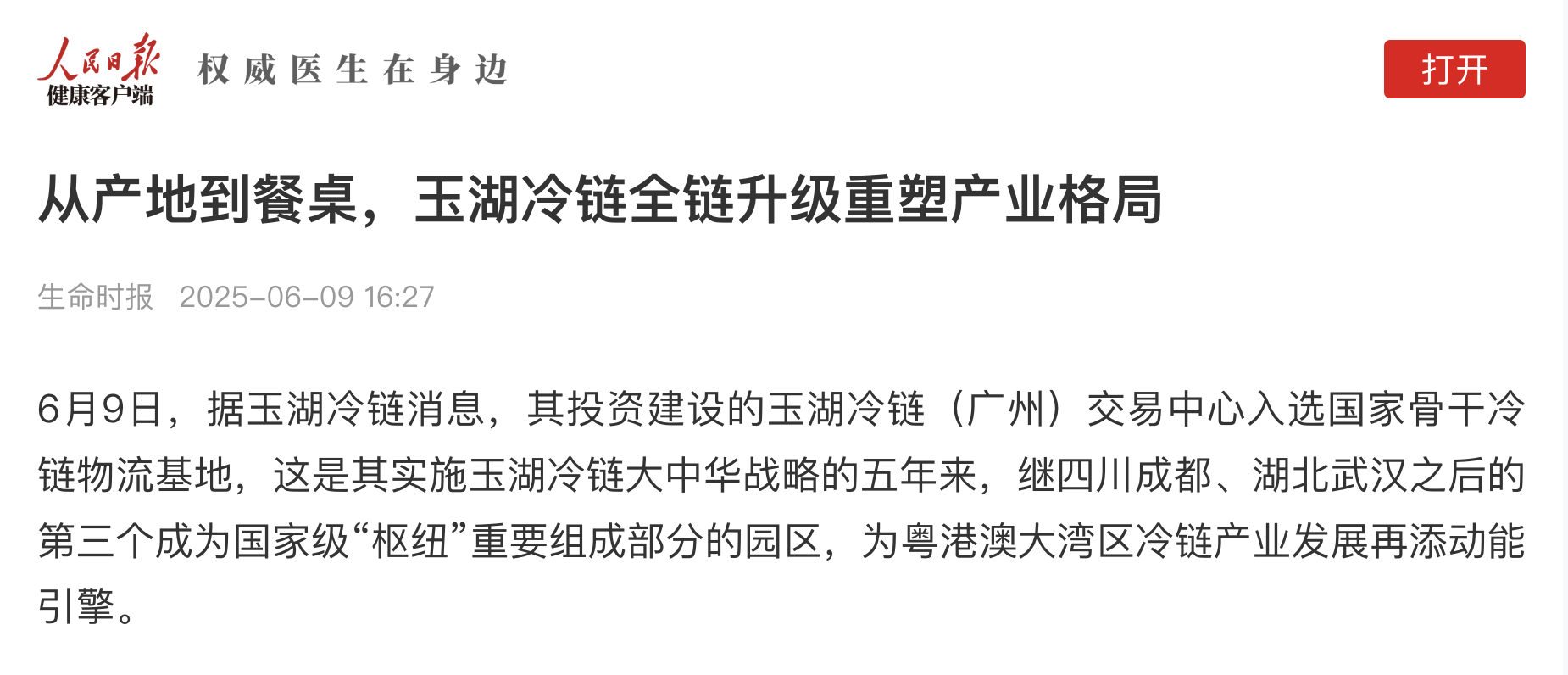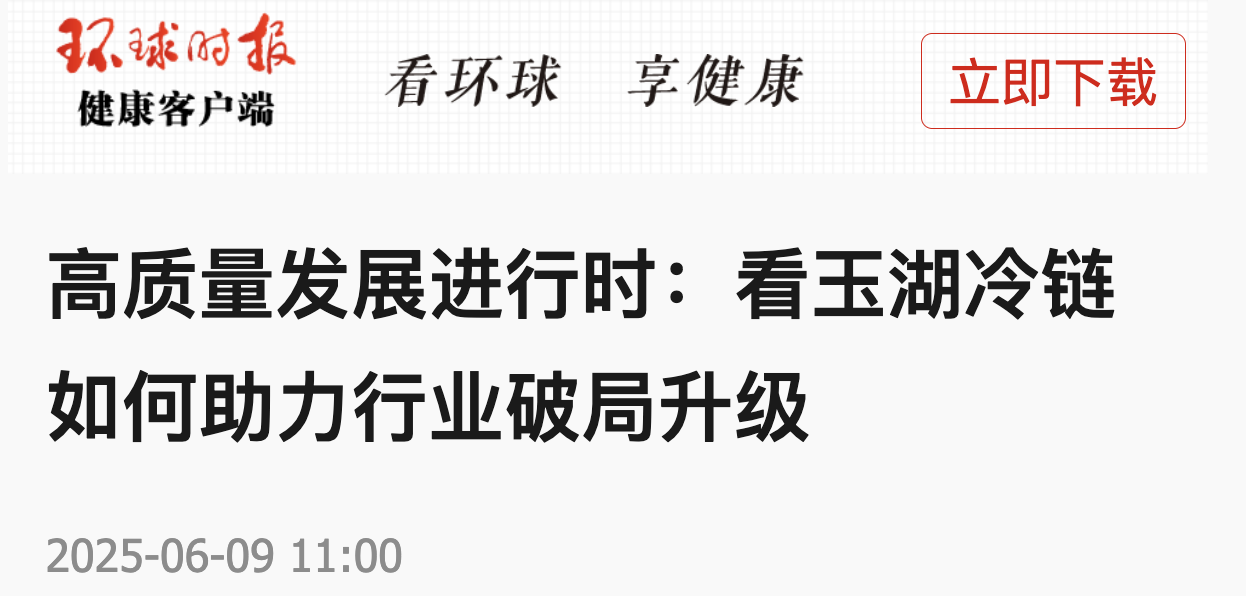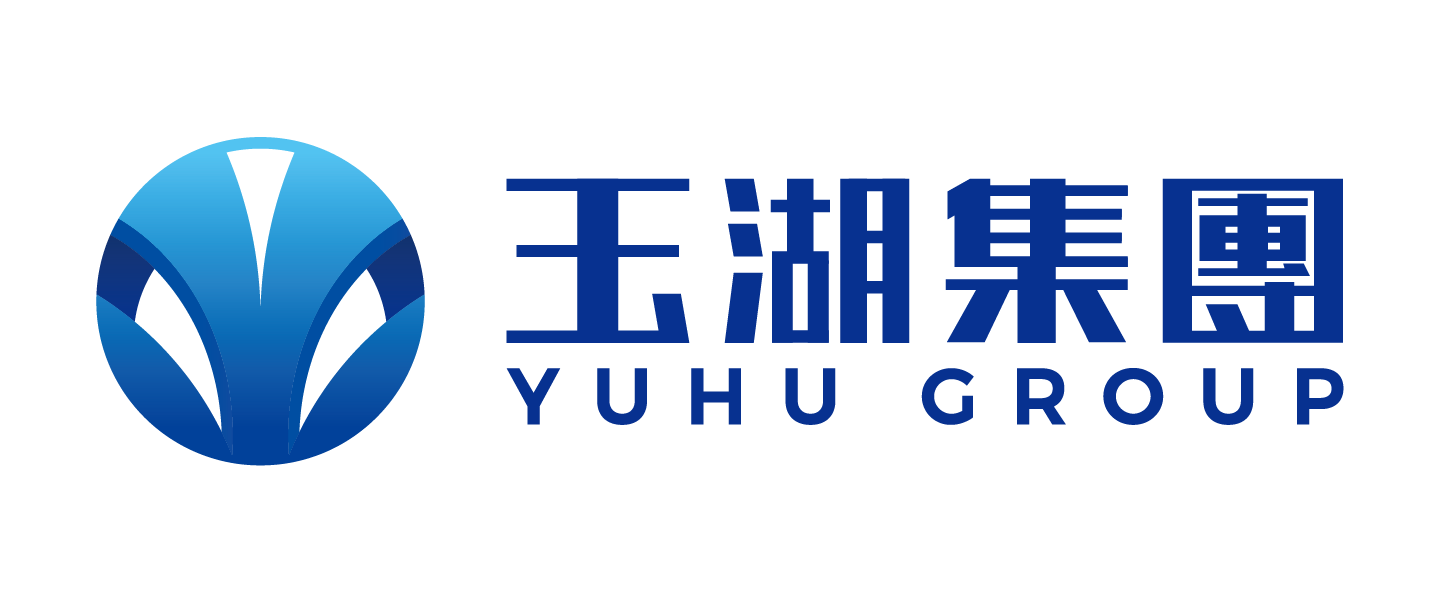Marking Yuhu Cold Chain's fifth anniversary, People's Daily and Global Times have published in-depth features analysing how Yuhu Cold Chain has cultivated cold chain infrastructure over the past five years. The articles highlight how Yuhu Cold Chain has deeply integrated international expertise with local requirements, combined regional industrial characteristics, and facilitated cross-regional resource circulation through cold chain supply networks to drive industry advancement.


Recently, the Yuhu Cold Chain (Guangzhou) Trading Centre, built and invested in by Yuhu Cold Chain, was selected as a National Backbone Cold Chain Logistics Base. This represents the third facility to become an integral part of a national-level "hub" in the five years since implementing Yuhu's Greater China strategy, following Chengdu and Wuhan. This addition provides new momentum for cold chain industry development in the Guangdong-Hong Kong-Macau Greater Bay Area.
Against the global supply chain adjustments, more companies like Yuhu Cold Chain are strategically anchoring themselves to opportunities in China, closely aligning corporate development with national strategies.
Data shows that in the first quarter of 2025, 12,603 new foreign-invested enterprises were established nationwide, a year-on-year increase of 4.3%. For many foreign investors in China, its a critical component of their global strategy. Their commitment to China stems from the pursuit of higher delivery efficiency and service quality, as well as long-term confidence in the vast opportunities within the Chinese market. Hong Kong investors, with their advantageous open systems, play an increasingly prominent role as important bridges connecting international and domestic markets.
Hong Kong Investment Driving Regional Economy Growth
As a Hong Kong-based enterprise, Yuhu Cold Chain has made a strong nationwide presence covering 800 million people, including the Beijing-Tianjin-Hebei region and the Greater Bay Area, with nearly 30 billion yuan invested in national cold chain infrastructure. The company's national cold chain trading centres exceed 2.6 million square metres in total building area, with a cold storage capacity of 1.5 million tonnes. The Chengdu project was selected as a "National Backbone Cold Chain Logistics Base" in 2022, while the Guangzhou project was selected as an Guangzhou “Airport-based National Logistic Hub” in 2023, with both becoming operational in 2024. The Wuhan project was selected as a "Commercial Service National Logistics Hub" in 2024, with its cold store zone officially launched last month, while the Jieyang ‘s Fresh Produce Zone has entered the trial operation phase. The Guangzhou, Chengdu, Wuhan, and Changsha facilities have all been selected as Public Infrastructure Project for Both Regular and Emergency Use in their respective cities. Projects in Wuhan, Jieyang, Meishan, and Xiangyang will become operational within 2025.
This strategic investments by Yuhu Cold Chain not only demonstrates Hong Kong investors' determination to develop in China but also explores a path for Hong Kong investment that combines commercial value with social benefits through the localization of international expertise. As Mr. Huang Xiangmo, Founder and Chairman of Yuhu Group, stated: "A company's development must resonate with national strategies." When planning the national cold chain network, the company not only referenced Western experiences but also focused on addressing pain points in China's cold chain industry, noting that "food safety and agricultural product preservation technology urgently need improvement, and we must build an open, safe, and stable supply chain system."
In 2020, the company keenly grasped the strategic value of the Greater Bay Area as an important national sales market, anchoring to the region's cold chain food circulation upgrade needs and initiating planning and construction. By integrating global cold chain resources and building a full-chain service platform, it simultaneously advanced infrastructure and supply chain innovation. This deployment closely aligns with national strategic guidance, preceding the 2022 "Building a Unified National Market" plan. In April 2024, the Yuhu Cold Chain Guangzhou became fully operational, attracting over 600 cold chain food enterprises, including industry leaders with annual transaction values exceeding 2 billion yuan. Through the integration of online trading and offline fulfilment systems, it is promoting digital upgrades in cold chain transactions in the Greater Bay Area, supporting the "Hundred-Thousand Project" and regional integrated development. Its "OMO model" (online trading, offline fulfillment) has established a supply chain ecosystem with convenient transactions and full traceability.
High Standards Driving Cold Chain Upgrades
Yuhu Cold Chain's core competitiveness from "international standards + local innovation," restructuring the industry ecosystem with the "OMO model." As China's representative participating in ISO cold chain international standard development, the international standard "Requirements for Contactless Delivery Services in Cold Chain Logistics" (ISO31511:2024), which it led in drafting, and "Cold Chain Logistics Services in B to B Sector-Requirements and Guidelines for Storage and Transport" (ISO31512:2024), which it participated in drafting, have been officially released, providing technical guidance for global cold chain logistics services.
In terms of hardware facilities, each project has built 100,000-300,000-tonne cold store cluster, adopting super-high shelf designs that improve storage efficiency by 30-50% compared to traditional cold store, and achieving full temperature coverage from -60°C to normal temperature. More than 2,000 temperature and humidity sensors are deployed within the warehouses to monitor key areas such as corridors and cold storage zones in real-time, ensuring traceability of temperature control data throughout the chain.
For software systems, the self-developed intelligent park management system integrates full-chain services including warehousing & logistics, trading, and supply chain finance, improving transaction processing efficiency by nearly 60%. Regular support services such as business matching, export consultation, and digital training are provided to merchants, helping merchants and upstream and downstream enterprises achieve zero-barrier digital upgrades and quickly integrate into Yuhu Cold Chain's diverse online trading ecosystem. This series of innovative practices is driving the cold chain industry toward intelligent, standardized, and international development.
In rural revitalization practices, Yuhu Cold Chain has created " Regional Product Exhibition Centre" business model, establishing deep cooperation with major agricultural product production areas and building a one-stop service system of "resources - logistics - high-standard storage - direct market connection." Specialty agricultural products such as Ningdu chicken and Anyuan orange juice directly reach the Greater Bay Area through Yuhu Cold Chain's Greater Bay Area Jiangxi Hall. The standardization and branding upgrade of agricultural products not only increases their added value but also promotes the full-chain upgrade of the agricultural product industry chain from "source to table."
Yuhu Cold Chain has deeply embedded ESG (Environmental, Social, and Governance) concepts throughout its industry chain. Its cold chain facilities adopt low-carbon refrigeration systems, reducing energy consumption by 40% compared to traditional facilities. Rooftop photovoltaic power generation devices reduce carbon dioxide equivalent emissions by nearly 3,000 tonnes annually, equivalent to the annual electricity consumption of thousands of households.
These practices are highly aligned with national policies. The "14th Five-Year Cold Chain Logistics Development Plan" clearly proposes "building production and sales cold chain distribution centres," while Yuhu Cold Chain's OMO model achieves the integration of "trade, logistics, financial support, and information" through the linkage of digital trading platforms and smart facilities, providing solutions for the full-chain loss reduction of agricultural products from source to table. Agricultural product wholesale markets need to "strengthen infrastructure construction and promote online and offline integration," and Yuhu Cold Chain's exploration is a vivid footnote to this direction.


